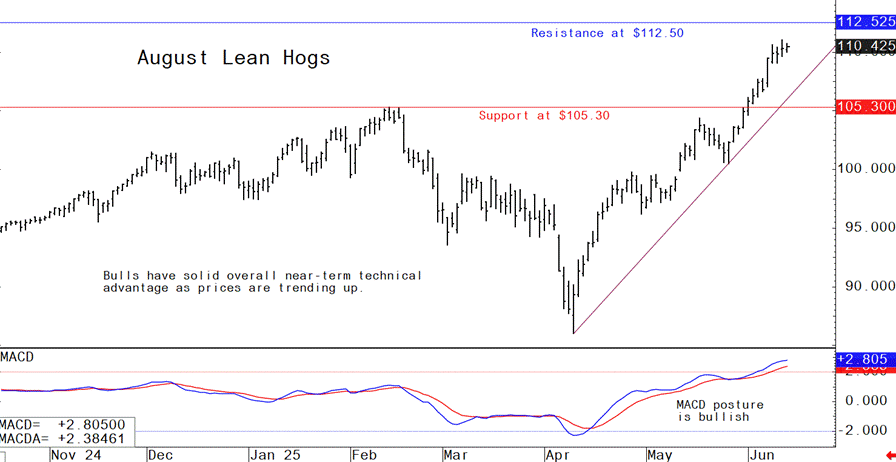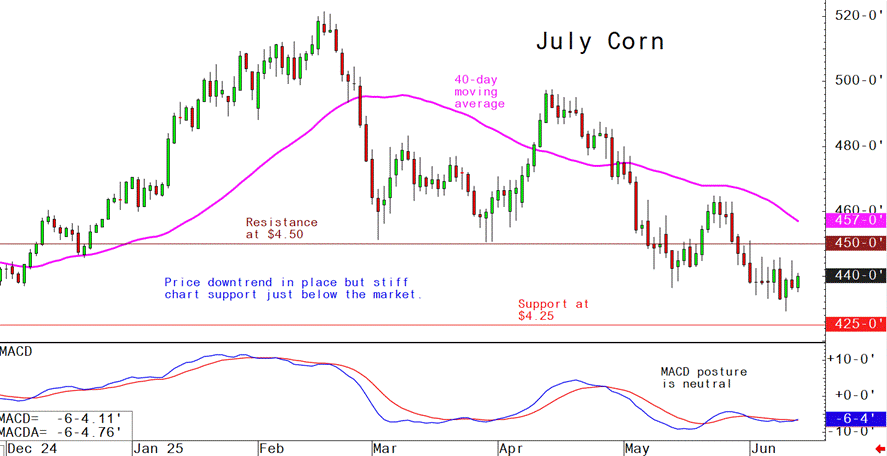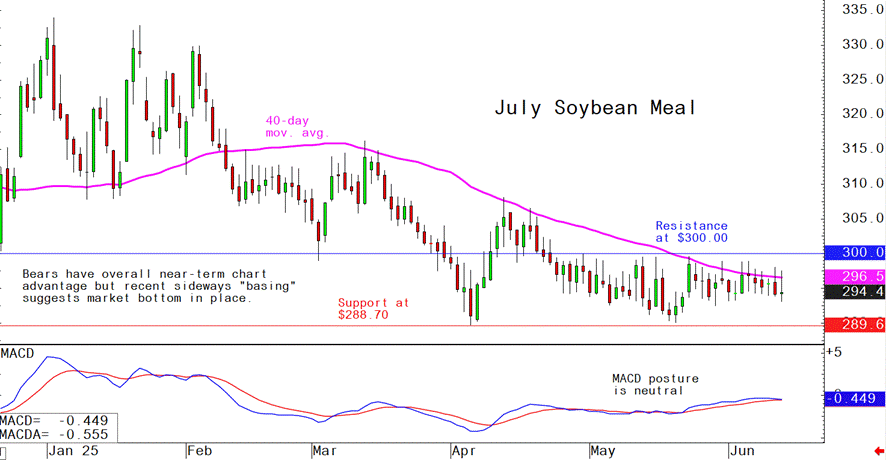



Pig outlook: Lean hog futures bulls keep pedal to the metal
Livestock analyst Jim Wyckoff reports on global pig newsLean hog futures prices this week hit contract highs as cash hog and pork fundamentals remain solid. The latest CME lean hog index topped $100.00 for the first time since Aug. 16, 2023 as it is up another 94 cents to $100.91 as of June 10. Pork cutout remains supportive of higher cash hog prices as well. Some consolidation would be healthy for the market as futures are near-term overbought. This week’s inflation report from the Bureau of Labor Statistics showed pork prices down from both a month and a year ago. That relative cheapness compared to elevated beef prices likely has consumers opting for pork at the meat counter this grilling season.
Latest USDA and other news regarding the global pork industry
Weekly USDA US pork export sales
Pork: Net sales of 9,700 MT for 2025 were down 73 percent from the previous week and 70 percent from the prior 4-week average. Increases primarily for Japan (3,600 MT, including decreases of 100 MT), Canada (1,900 MT, including decreases of 300 MT), Colombia (1,400 MT), South Korea (900 MT, including decreases of 500 MT), and China (700 MT, including decreases of 400 MT), were offset by reductions for Mexico (1,200 MT) and Honduras (600 MT). Exports of 33,800 MT were up 40 percent from the previous week and 25 percent from the prior 4-week average. The destinations were primarily to Mexico (12,800 MT), Japan (5,100 MT), Colombia (4,100 MT), China (3,200 MT), and South Korea (2,500 MT).
China extends by six months its probe into EU pork imports
Beijing ties case to EV tariff talks with Brussels as tensions simmer
China announced Tuesday that it will extend its anti-dumping investigation into pork imports from the European Union by an additional six months, pushing the probe’s conclusion to Dec. 16, 2025. The Chinese Ministry of Commerce cited the “complexity” of the case as justification for the delay.
While officially framed as a routine procedural extension, the move is widely seen as retaliation for EU tariffs on Chinese electric vehicles (EVs) imposed in 2024. Analysts note that the extension comes at a critical juncture in ongoing negotiations between the EU and China, which are working toward a broader trade arrangement over EV duties. Brussels had argued that Chinese EVs were benefiting from unfair state subsidies, prompting the tariffs.
The original pork investigation — launched in response to an industry complaint — was interpreted as a targeted measure aimed at European agricultural exporters, particularly Spain, Denmark, and the Netherlands, which are among the largest suppliers of pork to China.
Trade watchers now see the pork case as a bargaining chip. “This is tit-for-tat diplomacy with ag and autos at the center,” said one Beijing-based trade policy analyst. Talks are reportedly progressing, but no final deal has been announced.
The extension underscores the high-stakes nature of the trade standoff, with billions of euros in exports on the line for both sides.
Supreme Court Holds Off on Prop 12 Cert Decision — Still Weighing Major Pork Industry Challenge
Justices discuss Iowa Pork Producers’ discrimination claims at June 5 conference; no ruling yet on second review of California’s animal welfare law
The U.S. Supreme Court considered whether to hear a new challenge to California’s Proposition 12 during its June 5 private conference, but as of Monday morning, June 9, no decision has been made public. The case, Iowa Pork Producers Association v. Bonta, raises fresh constitutional concerns about whether California’s rules on animal confinement unlawfully discriminate against out-of-state pork producers.
The high court has now relisted the petition multiple times — on May 15, May 22, and again for discussion at the June 5 conference. This suggests continued interest among the justices, but not yet consensus on how — or whether — to proceed.
A New Theory: Discrimination by Design
The Iowa Pork Producers Association (IPPA) claims California’s Prop 12 gives in-state farmers an unfair economic edge by:
— Providing free certification audits through the California Department of Food and Agriculture, while forcing out-of-state producers to hire private, paid auditors;
— Giving California producers six years to comply under an earlier state law (Prop 2), while imposing a much shorter transition period on out-of-state producers.
IPPA argues this creates intentional economic discrimination, violating the Constitution’s Dormant Commerce Clause. This line of attack was not raised in the previous Prop 12 case the Supreme Court considered in 2023.
Dormant Commerce Clause and Pike Balancing in Focus
The case also seeks clarification on how to interpret fractured Supreme Court rulings. In the 2023 National Pork Producers Council v. Ross decision, the Court upheld Prop 12 in a splintered 5–4 ruling, but without a clear majority rationale. IPPA now argues that under the Marks v. United States standard, the Court’s Pike v. Bruce Church balancing framework — used to evaluate burdens on interstate commerce — should govern.
They claim the Ninth Circuit misapplied that precedent when it dismissed their suit and avoided Pike balancing altogether. Several states and industry groups have filed amicus briefs supporting review, warning of rising interstate regulatory conflicts if Prop 12 stands.
June 5: A Conference with No Answer — Yet
The June 5 Supreme Court conference came and went without a definitive ruling on the Prop 12 case. It’s possible the justices are still debating how to proceed — whether to grant full review, issue a summary ruling, or decline the case entirely.
Supreme Court watchers note that repeated relistings often indicate serious internal deliberations. The Court may be considering how far states can go in regulating the production methods of goods sold across state lines, a question with growing relevance as more states pursue state-specific climate, food, or animal welfare mandates.
China’s May meat imports unchanged from April, down from year-ago
China imported 513,000 MT of meat in May, unchanged from the previous month but down 7.9% from last year. Through the first five months of the year, China imported 2.67 MMT of meat, down 3.9% from the same period last year.
The next week’s likely high-low price trading ranges:
August lean hog futures--$107.00 to $113.00 and with a sideways-higher bias
July soybean meal futures--$289.70 to $308.10, and with a sideways bias
July corn futures--$4.29 1/4 to $4.50 and a sideways bias
Latest analytical daily charts lean hog, soybean meal and corn futures












